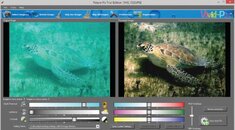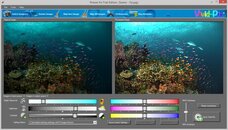This whole thread makes me nervous. There are very few divers who could jump in the water after 15 years and have enough buoyancy control and situational awareness to keep themselves safe, not harm the reef, keep an eye on the kids, and still get some decent pix with a brand-new camera and housing. Jeez.
You are using an out of date browser. It may not display this or other websites correctly.
You should upgrade or use an alternative browser.
You should upgrade or use an alternative browser.
Would I be wasting my time without a strobe?
- Thread starter JarrodS
- Start date
Please register or login
Welcome to ScubaBoard, the world's largest scuba diving community. Registration is not required to read the forums, but we encourage you to join. Joining has its benefits and enables you to participate in the discussions.
Benefits of registering include
- Ability to post and comment on topics and discussions.
- A Free photo gallery to share your dive photos with the world.
- You can make this box go away
Well, I have dabbled in astrophotography. You know what would happen if you took an expensive camera/recording device and stuck it onto an old 50mm telescope from a department store? The system is what gets you the results, the combination of components.
As well, to get good photos, other than by luck and without destroying the coral and bottom life, the diver needs to be a rock solid platform. You need to be able to maneuver, up, down, forward, back, spin, whatever without any use of arms or hands, fins only and you need, to be a rock solid camera platform, excellent buoyancy and diving skills.
The way to get good photos is to get close, about three feet or less, which means you either need a wide angle lens or a macro lens and in either case good strobes.
N
As well, to get good photos, other than by luck and without destroying the coral and bottom life, the diver needs to be a rock solid platform. You need to be able to maneuver, up, down, forward, back, spin, whatever without any use of arms or hands, fins only and you need, to be a rock solid camera platform, excellent buoyancy and diving skills.
The way to get good photos is to get close, about three feet or less, which means you either need a wide angle lens or a macro lens and in either case good strobes.
N
Manneca
Contributor
- Messages
- 239
- Reaction score
- 105
- # of dives
- 1000 - 2499
I dive about 100 dives a year now. I almost never take my camera on the first one (or two if its a boat dive) of my trip. I want to make sure everything is OK with my equipment. I want to see what the conditions are like. I usually don't take a camera on moderate to strong current dives. I don't get pictures and the equipment is a drag.
I do a fair amount of land photography and underwater photography is much more difficult. It's difficult to get stable. It's difficult to get your stobes pointed exactly where you want them to be. Focus can be difficult if you're doing macro because your depth of field is shallow and the water may be moving you around, and your breathing probably is moving you up and down a bit.
Since it's a new camera to you, I'd also suggest that you practice knowing where all your settings are and how to use them through your housing.
And if your diving with your sons (assuming they are under 18), you will probably want to devote a lot of your attention to them.
I do a fair amount of land photography and underwater photography is much more difficult. It's difficult to get stable. It's difficult to get your stobes pointed exactly where you want them to be. Focus can be difficult if you're doing macro because your depth of field is shallow and the water may be moving you around, and your breathing probably is moving you up and down a bit.
Since it's a new camera to you, I'd also suggest that you practice knowing where all your settings are and how to use them through your housing.
And if your diving with your sons (assuming they are under 18), you will probably want to devote a lot of your attention to them.
Focus can be difficult if you're doing macro because your depth of field is shallow and the water may be moving you around, and your breathing probably is moving you up and down a bit.
That's exactly why I went with the Nikon 1 series. The smaller sensor (relative to other mirrorless systems) makes DOF more forgiving. That, combined with its lightning fast contrast + phase detection focusing should give me a big advantage with focus in the "less than optimal" situations that being in the ocean presents.
---------- Post added July 10th, 2015 at 12:01 PM ----------
Found this in a sticky at the top of the "Tips and Tricks" forum.
http://jimspears.net/camera/gettingstarted.pdf
Somewhat in-depth discussion of the issues I raised here, and reinforces my idea to skip the strobe for now. Also reinforces the advice given above to leave the camera on the boat for the first few dives, at least.
Hi JarrodS, All,
As you know from your comments and good thoughts from others, light is needed to get a picture.
The next question is how much light is necessary to get a good image... Strobes and lights make sense...
This picture on the left was taken in around 40', Canon point and shoot, without a strobe. The "Vivid-Pix Fix" picture on the right can be achieved in 1-click, or in a few extra seconds to fine-tune with sliders.

I, like you (and many others), didn't want to spend the $$$'s on a strobe. So, with my partner, ended up spending a lot more, but also invented something that helps well lit and not so well lit (under and over exposed) pictures. Vivid-Pix Picture-Fix software. (www.vivid-pix.com).
Here's a quick promo video that shows what we do (a lot more than adding a red filter): Vivid-Pix Promo Video - Vivid-Pix
The software is only $50 bucks and we provide a Free Trial so you can check it out first.
I want to point out that using a strobe and Picture-Fix is a great way to take pics too.
Here's a great 1-click fix taken by Cathy Church that exemplifies what we can do with distance shots.

Please give it a try and also feel free to ask any questions,
Rick
P.S. I was a sponsor of the ScubaBoard Invades Cozumel event and we have a 10% off coupon running through Monday, 7/13.
- Free Trial and 10% off link: http://vivid-pix.com?pop_code=3SBCozumelSAVE10
As you know from your comments and good thoughts from others, light is needed to get a picture.
The next question is how much light is necessary to get a good image... Strobes and lights make sense...
This picture on the left was taken in around 40', Canon point and shoot, without a strobe. The "Vivid-Pix Fix" picture on the right can be achieved in 1-click, or in a few extra seconds to fine-tune with sliders.

I, like you (and many others), didn't want to spend the $$$'s on a strobe. So, with my partner, ended up spending a lot more, but also invented something that helps well lit and not so well lit (under and over exposed) pictures. Vivid-Pix Picture-Fix software. (www.vivid-pix.com).
Here's a quick promo video that shows what we do (a lot more than adding a red filter): Vivid-Pix Promo Video - Vivid-Pix
The software is only $50 bucks and we provide a Free Trial so you can check it out first.
I want to point out that using a strobe and Picture-Fix is a great way to take pics too.
Here's a great 1-click fix taken by Cathy Church that exemplifies what we can do with distance shots.

Please give it a try and also feel free to ask any questions,
Rick
P.S. I was a sponsor of the ScubaBoard Invades Cozumel event and we have a 10% off coupon running through Monday, 7/13.
- Free Trial and 10% off link: http://vivid-pix.com?pop_code=3SBCozumelSAVE10



